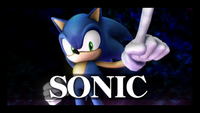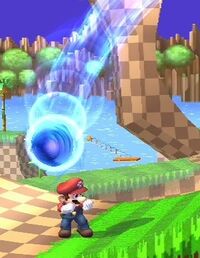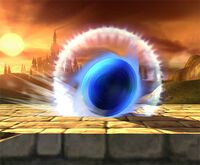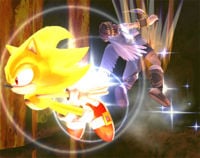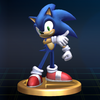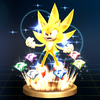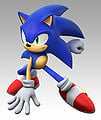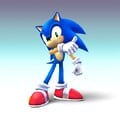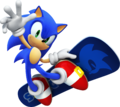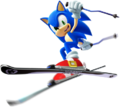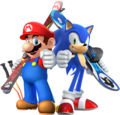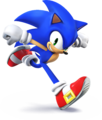Sonic: Difference between revisions
WhiteShyGuy (talk | contribs) m (→History) |
WhiteShyGuy (talk | contribs) m (→History) |
||
| Line 17: | Line 17: | ||
==History== | ==History== | ||
=== Concept and creation === | === Concept and creation === | ||
In April of 1990, Sega requested for a game capable of selling more than 1,000,000 copies and a character who could compete against Nintendo's Super Mario as well as replace the Sega's mascot at that time, | In April of 1990, Sega requested for a game capable of selling more than 1,000,000 copies and a character who could compete against Nintendo's Super Mario as well as replace the Sega's mascot at that time, Alex Kidd. Several character designs were submitted, that which included an armadillo, a dog, and a rabbit. Eventually, the mascot they selected was a spiky teal hedgehog named "Mr. Needlemouse", who was later renamed Sonic, submitted by Naoto Oshima. The original concepts of Sonic the Hedgehog depicted him of being in a band with a human girlfriend named Madonna, who would play a similar role like that of Pauline from the original Donkey Kong. After a few minor adjustments and redesigning, the Sonic Team developed the first title in what would become the phenomenally successful Sonic the Hedgehog series. | ||
Alex Kidd | |||
. Several character designs were submitted, that which included an armadillo, a dog, and a rabbit. Eventually, the mascot they selected was a spiky teal hedgehog named "Mr. Needlemouse", who was later renamed Sonic, submitted by Naoto Oshima. The original concepts of Sonic the Hedgehog depicted him of being in a band with a human girlfriend named Madonna, who would play a similar role like that of Pauline from the original Donkey Kong. After a few minor adjustments and redesigning, the Sonic Team developed the first title in what would become the phenomenally successful Sonic the Hedgehog series. | |||
=== History === | === History === | ||
Nintendo was once business rivals with Sonic's company of creation, Sega; this rivalry peaked during the 16-bit era (the era of the [[Super Nintendo]]). As such, Nintendo and Sega often attempted to put each other down through their games (thus explaining Sonic's humiliation in ''[[Donkey Kong Country 2: Diddy's Kong Quest|Donkey Kong Country 2]]'' [elaborated on below], and possibly explaining the [[Harry Hedgehog|blue hedgehog enemies]] of ''[[Super Mario World 2: Yoshi's Island]]''). Examples of [[List of Mario references in video games|Mario mockeries]] in the ''Sonic the Hedgehog'' series forms of media include the emphasis on "Super" on the back of ''Sonic the Hedgehog'''s box (a reference to ''[[Super Mario Bros.]]'' and other ''Mario'' series titles beginning with "Super") and the Marxio Brothers of ''Sonic the Comic'', a British comic book about Sonic and his friends. Their rivalry went throughout the 90's and until 2001 when Sega left as a console manufacturer and became third-party. Sonic's first game for a Nintendo system was an enhanced remake of ''Sonic Adventure 2'' for the [[Nintendo GameCube]], titled, ''Sonic Adventure 2: Battle''. | Nintendo was once business rivals with Sonic's company of creation, Sega; this rivalry peaked during the 16-bit era (the era of the [[Super Nintendo]]). As such, Nintendo and Sega often attempted to put each other down through their games (thus explaining Sonic's humiliation in ''[[Donkey Kong Country 2: Diddy's Kong Quest|Donkey Kong Country 2]]'' [elaborated on below], and possibly explaining the [[Harry Hedgehog|blue hedgehog enemies]] of ''[[Super Mario World 2: Yoshi's Island]]''). Examples of [[List of Mario references in video games|Mario mockeries]] in the ''Sonic the Hedgehog'' series forms of media include the emphasis on "Super" on the back of ''Sonic the Hedgehog'''s box (a reference to ''[[Super Mario Bros.]]'' and other ''Mario'' series titles beginning with "Super") and the Marxio Brothers of ''Sonic the Comic'', a British comic book about Sonic and his friends. Their rivalry went throughout the 90's and until 2001 when Sega left as a console manufacturer and became third-party. Sonic's first game for a Nintendo system was an enhanced remake of ''Sonic Adventure 2'' for the [[Nintendo GameCube]], titled, ''Sonic Adventure 2: Battle''. | ||
Revision as of 16:54, February 26, 2014
Template:Character-infobox Template:LLquote
Sonic the Hedgehog is the eponymous main protagonist of the Sonic the Hedgehog series of video games. He has been Sega Corporation's mascot since 1991. Since the beginning of the series, Sonic has been the champion of peace, risking his life to stop the plots of a variety of violent foes, particularly Dr. Eggman, in order to establish worldwide peace. Along the way, he has been aided by many characters, including his friends Miles "Tails" Prower, Knuckles the Echidna, Amy Rose, and occasionally Shadow the Hedgehog. Sonic's greatest asset is his ability to run at supersonic speeds. However, he is also prone to making rash decisions and dislikes being near water because he can't swim.
Sonic has appeared in crossover titles alongside Mario in the Mario & Sonic series, Super Smash Bros. Brawl, and Super Smash Bros. for Nintendo 3DS / Wii U.
In these crossovers, Sonic is voiced by Jason Griffith and Roger Craig Smith.
History
Concept and creation
In April of 1990, Sega requested for a game capable of selling more than 1,000,000 copies and a character who could compete against Nintendo's Super Mario as well as replace the Sega's mascot at that time, Alex Kidd. Several character designs were submitted, that which included an armadillo, a dog, and a rabbit. Eventually, the mascot they selected was a spiky teal hedgehog named "Mr. Needlemouse", who was later renamed Sonic, submitted by Naoto Oshima. The original concepts of Sonic the Hedgehog depicted him of being in a band with a human girlfriend named Madonna, who would play a similar role like that of Pauline from the original Donkey Kong. After a few minor adjustments and redesigning, the Sonic Team developed the first title in what would become the phenomenally successful Sonic the Hedgehog series.
History
Nintendo was once business rivals with Sonic's company of creation, Sega; this rivalry peaked during the 16-bit era (the era of the Super Nintendo). As such, Nintendo and Sega often attempted to put each other down through their games (thus explaining Sonic's humiliation in Donkey Kong Country 2 [elaborated on below], and possibly explaining the blue hedgehog enemies of Super Mario World 2: Yoshi's Island). Examples of Mario mockeries in the Sonic the Hedgehog series forms of media include the emphasis on "Super" on the back of Sonic the Hedgehog's box (a reference to Super Mario Bros. and other Mario series titles beginning with "Super") and the Marxio Brothers of Sonic the Comic, a British comic book about Sonic and his friends. Their rivalry went throughout the 90's and until 2001 when Sega left as a console manufacturer and became third-party. Sonic's first game for a Nintendo system was an enhanced remake of Sonic Adventure 2 for the Nintendo GameCube, titled, Sonic Adventure 2: Battle.
Donkey Kong Country 2: Diddy's Kong Quest
Sonic is referenced in Donkey Kong Country 2: Diddy's Kong Quest. In the Cranky's Video Game Heroes awards ceremony, Sonic's shoes and Earthworm Jim's plasma gun can be seen next to a trash can, along with a sign saying "No Hopers." This detail was removed for the Game Boy Advance port.
Mario & Sonic series
Mario & Sonic at the Olympic Games
- “Mario and Sonic have been respectful rivals since the early days of video games. In fact, for a long time they have been discussing the possibility of one day competing against each other. Now that they have been given the perfect opportunity to meet at the Olympic Games, we may finally learn who is actually faster, Mario or Sonic?”
- —Shigeru Miyamoto
Sonic competes against Mario and others in Olympic events in the game Mario & Sonic at the Olympic Games. He is a Speed character, similar to Yoshi, meaning he has great speed, but low power. Sonic wears a blue life jacket during the swimming events, since he can't swim. He still moves quite fast in water too.
Mario & Sonic at the Olympic Winter Games
Sonic, once again, crosses over with Mario in Mario & Sonic at the Olympic Winter Games. As in Mario & Sonic at the Olympic Games, he is a speed type character and is the fastest one in the game. In the Adventure Tours mode for the DS version, Bowser and Dr. Eggman team up to ruin the 2010 Olympics. Bowser melts all of the snow at the event, and Dr. Eggman kidnaps all of the snow spirits to prevent any snowfall. Sonic and Mario team up in order to ruin Bowser and Dr. Eggman's plans to ruin the Olympics and to save the snow spirits.
Mario & Sonic at the London 2012 Olympic Games
Sonic makes yet another crossover appearance with Mario and friends in Mario & Sonic at the London 2012 Olympic Games. Like in the previous two installments of the series, Sonic is a Speed type character. This game is notable for being the first in the series to feature Roger Craig Smith as Sonic's new voice actor. Sonic has dialogue for the Wii version of the game in the London Party mode, but not the 3DS version's Story Mode.
In the 3DS version's Story Mode, Sonic is first seen with Miles "Tails" Prower just arriving at London for the Olympic Games. Not long after the two arrive, fog starts rolling in, though the fog is red. Sonic and Tails decide that this is Bowser and Eggman's doing and later meet up with Mario, Luigi, and Toad to put a stop to the evil villians' plot. After their defeat, Bowser and Dr. Eggman claimed they never got their invitations to the games which is the reason why they started the plot. As it turns out, they mistaken their invitations for love letters since Princess Peach and Amy wrote them. After clearing up the problem, Sonic, Tails, Mario and Luigi invite Bowser and Dr. Eggman to the Opening Ceremony and to compete in the Olympic Games.
Mario & Sonic at the Sochi 2014 Olympic Winter Games
Sonic also appears as a playable character in Mario & Sonic at the Sochi 2014 Olympic Winter Games. He is once again a Speed-type character.
Super Smash Bros. series
Super Smash Bros. Brawl
- Main article: SmashWiki:Sonic (SSBB)
Sonic is in Super Smash Bros. Brawl as a character who is unlocked by completing the game's story mode. He along with Solid Snake are the first non-Nintendo characters in the Super Smash Bros. series. Sonic is the fastest character in the game, running faster than Captain Falcon, the fastest character from the last two Super Smash Bros. games. Several of Sonic's moves are from the original Sonic the Hedgehog game, with the exception of Spin Dash, trademark move, and Homing Attack, which debuted later in the series. His Final Smash move is using the Chaos Emeralds to transform into Super Sonic and fly around the stage attacking opponents.
Sonic and Solid Snake are the only third party characters to appear playable in the game. Also, whenever Sonic wins a brawl, his victory theme will play. This is played exactly the same way as the famous stage clear theme that is played in the 2006 Sonic the Hedgehog game, that tune being a remix of the stage clear theme from Sonic the Hedgehog 3 and most Sonic games after that. Sonic's Trophy is one of the few trophies that isn't restricted to a Nintendo console., and Sonic's Final Smash trophy is the only Final Smash trophy to have game information other than just Super Smash Bros. Brawl.
Role in the Subspace Emissary
Sonic does not appear in the Subspace Emissary until the very end, after The Great Maze. As when every fighter makes it to where Tabuu resides, he prepares his Off Waves, which would have turned every character into a trophy. As soon as he's about to release the attack, a dashing blue blur dashes past the fighters, and rams into both of Tabuu's wings; causing the Off Wave attack to fail. As the blue blur jumps up on a "peak", he reveals himself to be Sonic. While he taunts, Tabuu's wings break apart, and then six fighters are selected to fight Tabuu in the final battle. Sonic, along with Jigglypuff, Squirtle, Toon Link, Wolf O'Donnell, and Zero Suit Samus, are the only characters that are never seen as trophies in The Subspace Emissary.
Solid Snake Codec Conversation
- Snake: ...
- Otacon: Snake, what is it?
- Snake: Something about that hedgehog rubs me the wrong way...
- Otacon: ...? Oh, you mean Sonic The Hedgehog? But everyone loves Sonic. He's a big star. Do you have any idea how excited people are that he's here in Brawl?
- Snake: Yeah, yeah, I know, but there's something about him I just don't like.
- Otacon: But...why? You must have some kind of reason.
- Snake: ...Nope, just don't like him.
Super Smash Bros. for Nintendo 3DS / Wii U
Template:Newsubject-section Sonic is confirmed to reappear in Super Smash Bros. for Nintendo 3DS / Wii U. He appears to have retained most of his moves from Super Smash Bros. Brawl. Along with Sonic himself, a stage based on Windy Hill from Sonic Lost World will also make an appearance.
Special Moves
Homing Attack
- Main article: SmashWiki:Homing Attack
Homing Attack is Sonic's standard special move in Super Smash Bros. Brawl. It is made to copy the Homing Attack move from several Sonic the Hedgehog games. If Sonic uses this attack on the ground, he will begin charging up in a ball, slowly elevating himself above the ground. When he gets high enough, he then charges at an opposing player by homing into them. After hitting or missing another player, Sonic will get out of his ball form and into his normal fighting stance, but he can use the Homing Attack again shortly after. If used in mid-air, Sonic will begin charging, but will launch himself at his opponent quicker than when used on the ground. Although the attack is called the Homing Attack, it can miss sometimes, and it's possible to block the attack. Kirby can use the Homing Attack if he copies Sonic's powers.
Spin Dash
- Main article: SmashWiki:Spin Dash
Template:Redirectshere Spin Dash is an attack used by Sonic in the game, Super Smash Bros. Brawl. This move acts as Sonic's Side Special Move, and has three effects. Firstly, Sonic will curl into a supersonic ball, and start rolling around the stage at high speeds. Charging up the move first can speed the attack up, similarly to Jigglypuff's Rollout attack. When Sonic hits a player, he will cause damage on them, possibly doing more damage the faster the attack. Sonic can also jump while using this move, meaning he can avoid falling off edges easier. Then, he can exit the attack and do another attack to push his opponent further away from the stage. Then, he can use exactly the same move again to get back onto the stage from afar. The move can also be used in mid-air. A similar attack is the Spin Charge.
Spring Jump
- Main article: SmashWiki:Spring Jump
Spring Jump is the name of Sonic's Up Special Move in Super Smash Bros. Brawl. When used, Sonic will pull a spring from the original Sonic the Hedgehog, and use it to bounce really high in the air. He can use this both on the ground and in mid-air. If he uses it on the ground, it will stay on the ground, allowing other players to bounce on in as well. Sonic cannot do damage when using the spring, however he can still use some of his aerial moves (but no Special Moves) afterwards (one of very few Up Special Moves that can do so). When the Spring falls in Mid-Air and hits an opponent it sends them straight downwards and deals some minor damage. Sonic can also use this move to recover from getting knocked off the edge of a stage.
Spin Charge
- Main article: SmashWiki:Spin Charge
Spin Charge is an attack in Super Smash Bros. Brawl, which is Sonic's Down Special Move. If Sonic uses this attack, the player can tap the special move button to charge the attack even further. Charging it up gives it a huge power and speed boost, more so than the Spin Dash's charge. The attack is very similar to Jigglypuff's Rollout attack.
Super Sonic
- Main article: SmashWiki:Super Sonic
Super Sonic is Sonic's super form, found in almost every mainstream Sonic the Hedgehog game. Super Sonic also appears in the game Super Smash Bros. Brawl, acting as his Final Smash. When the Smash Ball is broken open, Sonic gets circled by the seven Chaos Emeralds, and then transforms into Super Sonic. He is able to fly around the stage at free will in this form, injuring any character he touches, comparable to Volt Tackle.
However, the control is very poor, and he has huge inertia, but his air speed is extremely faster than his ground speed. This, however, can be his biggest downfall, as if he unwisely boosts his speed at the wrong time, he will end up running straight past his opponents, as they can dodge him easily if he's going too fast. As such, the player has to gain good control over Super Sonic's speed in order to use this move properly. However, if used properly, it can be one of the most devastating, KO-inducing Final Smashes in the game. Fortunately, Sonic can't self-destruct himself while using this Final Smash, but he does risk a SD if the Final Smash ends near the bottom blast lines.
Trophy Information
Sticker Information
| Image | Game | Effect |
|---|---|---|

|
Sonic the Hedgehog JP | [Arm] - Attack +21 Usable by: Sonic |

|
Sonic the Hedgehog US | [Throwing] - Attack +20 Usable by: Sonic |

|
Sonic the Hedgehog | [Body, Spin] - Attack +32 Usable by: Sonic |
| File:Super Sonic Sticker.jpg | Sonic the Hedgehog 2 | [Electric] - Resistance +27 Usable by: Sonic |
Mario Series Appearances
| Title | Description | Release Date | System/Format |
|---|---|---|---|
| Mario & Sonic at the Olympic Games | Playable Character | 2007 | Wii |
| Mario & Sonic at the Olympic Games | Playable Character | 2008 | Nintendo DS |
| Super Smash Bros. Brawl | Unlockable Playable Character | 2008 | Wii |
| Mario & Sonic at the Olympic Winter Games | Playable Character | 2009 | Nintendo DS |
| Mario & Sonic at the Olympic Winter Games | Playable Character | 2009 | Wii |
| Mario & Sonic at the London 2012 Olympic Games | Playable Character | 2011 | Wii |
| Mario & Sonic at the London 2012 Olympic Games | Playable Character | 2012 | Nintendo 3DS |
| Mario & Sonic at the Sochi 2014 Olympic Winter Games | Playable Character | 2013 | Wii U |
Official Profile and Statistics
Mario & Sonic at the Olympic Games
Profile
The fastest hedgehog in the world, this little blue speed demon often gets going so fast, he appears to be just a whirling blur. He'll usually be found in front of any of the speed-based events in these Olympic Games, and will be very difficult to catch in any of the short-distance sprints.
Stats
Mario & Sonic at the Olympic Winter Games
Profile
Sonic the Hedgehog is a blue hedgehog that moves at Sonic speed who joins Mario as they go head-to-head at the Olympic Winter Games! Armed with his signature attitude and Spin Dash ability on the Wii and DS, and Jump Dash ability on the DS, Sonic brings a new level of competition to the Olympic Winter Games as his team goes for gold in Vancouver!
Wii Stats
DS Stats
Gallery
- SonicOlympic.jpg
Mario & Sonic at the Olympic Games - SonicOlympcGames icon.PNG
Mario & Sonic at the Olympic Games (icon) - MSWGSonic.jpg
Mario & Sonic at the Olympic Winter Games - SonicMASATOWG.png
Mario & Sonic at the Olympic Winter Games - Sonic London Olympics.png
- Sonic fencing.png
Mario & Sonic at the London 2012 Olympic Games
Names in other languages
Trivia
- In Sonic's appearance in Sonic and the Black Knight, before the player starts a mission Sonic can be seen posing in a picture frame, Sonic's pose in that game is the same pose he used in Super Smash Bros. Brawl.
- In Sonic Generations, Classic Sonic's B Rank pose is his Super Smash Bros. Brawl artwork pose.
- After Sonic's appearance in Super Smash Bros. Brawl, Mario was suggested to appear in Sonic & Sega All-Stars Racing early in development as an exclusive character for the Wii version. However, Sega didn't approve as they believed that it could conflict with the Mario & Sonic series titles.
- In Super Mario RPG: Legend of the Seven Stars, Toadofsky says if he doesn't get rid of Composer's Block, he'll have to make music for a game starring a blue hedgehog, referencing Sonic.
External links
Template:MASATOG Template:MASATOWG
